|
|
|
Sort Order |
|
|
|
Items / Page
|
|
|
|
|
|
|
| Srl | Item |
| 1 |
ID:
142522
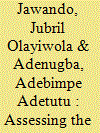

|
|
|
|
|
| Summary/Abstract |
This paper assesses the patterns of temporary employment in the food processing industry. Previous studies viewed temporary employment workers as homogeneous groups without focusing on the differences among temporary employees in Nigeria. This study is anchored on work stress models and social comparison or exchange theories as theoretical leanings. A sample size of 40 respondents were chosen for in-depth interviews through the snowball method from 15 casual workers, eight contract workers, six temporary workers, seven outsourced workers and four disengaged workers. The study found a high level of disparity among the various categories of temporary employees.
|
|
|
|
|
|
|
|
|
|
|
|
|
|
|
|
| 2 |
ID:
159871


|
|
|
|
|
| Summary/Abstract |
Identity cards and surveillance practices form an important part of migrant experience and politics. Drawing on fieldwork in construction sites and factory premises in Ernakulam district and a market frequented by migrants in Perumbavoor, a small city near Kochi in Kerala, this paper argues that ID-based surveillance of migrant workers occurs through a complex spatial web of state repression, local power structures and fissures within the classes of workers in Kerala. Migrant workers from North and Northeastern India, and unionized Malayali workers in construction sites and factories in Kerala, battle for and against these cards. Migrant workers resist not necessarily class power that inheres in capital, but the state and surveillance practices.
|
|
|
|
|
|
|
|
|
|
|
|
|
|
|
|
| 3 |
ID:
182943
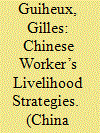

|
|
|
|
|
| Summary/Abstract |
This article evaluates the possibilities of individual agency in the case of a group of workers employed by a large garment factory in Zhejiang Province. The issue of workers’ ability to exercise power is tested by two sets of facts: workers’ job histories and workers’ household expenses. The author argues that workers’ agency is largely dependent upon gender, age, place of origin, and living arrangements. Workers’ main power is the possibility to quit a job. The overall conclusion is that agency remains limited by the precariousness of workers’ lives from a lifelong perspective.
|
|
|
|
|
|
|
|
|
|
|
|
|
|
|
|
| 4 |
ID:
106063
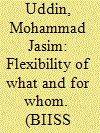

|
|
|
| 5 |
ID:
174489
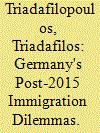

|
|
|
|
|
| Summary/Abstract |
The German experience shows that liberal democracies are able to develop effective policies and maintain the support of voters when they demonstrate that immigration is in the public interest and can be well managed.
|
|
|
|
|
|
|
|
|
|
|
|
|
|
|
|
| 6 |
ID:
130550
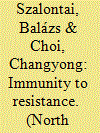

|
|
|
|
|
| Publication |
2014.
|
| Summary/Abstract |
Purpose-This article investigates whether certain social and subnational groups that have shown resistance against other one-party states might play a similar role in North Korea.
Design/methodology/approach-Comparing the DPRK with various Communist regimes and Baathist party-states in Syria and Iraq, this article examines the following social groups as potential factors of resistance: industrial workers, private entrepreneurs, and religious, ethnic and regional identities.
Findings-Resistance has not been wholly absent in North Korean, but the disaffected social groups have lacked sufficient bargaining power, while the state has occasionally refrained from steps that triggered protests in other countries.
Practical implications-By comparing the DPRK with various types of regimes (pre-reform Communist systems, partially market-oriented Communist systems, and Baathist party-states), the article also seeks to investigate whether the dynamics of North Korean society is largely unique, or if it can be at least partially explained by means of analogy.
|
|
|
|
|
|
|
|
|
|
|
|
|
|
|
|
| 7 |
ID:
190421
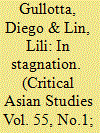

|
|
|
|
|
| Summary/Abstract |
This article examines the capacities of community-based labor nongovernment organizations (NGOs) in China to raise workers’ consciousness and build solidarity among workers in the post-2018 era. It closely studies the transformation of a community-based labor NGO in the Yangtze River Delta and investigates the relationships among managers, workers, community members, NGO staff members, and volunteers. Although state repression and funding concerns limit the space for workers and subalterns to represent themselves and act politically in China, the internal organizational structure of labor NGOs such as this has exacerbated their stagnation. This is due to a top-down decision-making process, a lack of democratic participation and transparency, selective inclusion, a neglect of collective possibilities, and techno-social features such as social media technology. The result is maintenance of the status quo. These organizational limitations prevent community-based labor NGOs from functioning as a progressive force and turns them into marginal social forces that strive to survive and are incapable of representing workers and adjusting to workers changing needs.
|
|
|
|
|
|
|
|
|
|
|
|
|
|
|
|
| 8 |
ID:
097379
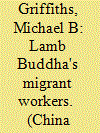

|
|
|
| 9 |
ID:
158261
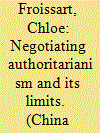

|
|
|
|
|
| Summary/Abstract |
Contrary to some scholars’ assertions, worker-led collective bargaining has become a practical reality in China, especially as seen in Guangdong Province between 2011 and 2015. This article analyses the practices and strategies of negotiation to show how this is possible in a regime that recognizes neither independent trade unions nor the right to strike. Labour NGOs have become a catalyst for collective action that enables workers to change the power balance with employers, official unions and local authorities and alter their response to labour conflicts. This article thus challenges the concept of ‘bargained authoritarianism’ by stressing social actors’ ability to carve out a space for negotiating authoritarianism despite obvious limits and tightening political constraints. However, collective bargaining will remain ad hoc and localized as long as trade unions and local authorities refuse to strike a durable alliance with workers and labour NGOs.
|
|
|
|
|
|
|
|
|
|
|
|
|
|
|
|
| 10 |
ID:
100618
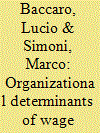

|
|
|
|
|
| Publication |
2010.
|
| Summary/Abstract |
This article contributes to the political economic literature regarding the effects of industrial relations institutions on national economic outcomes. Based on an econometric analysis of the determinants of wage moderation in sixteen industrialized countries between 1974 and 2000, it argues that the organizational characteristics of trade unions have a significant impact on wage dynamics. Controlling for a number of institutional and economic factors, the countries in which trade union confederations directly involve workers in the process of collective bargaining ratification have on average lower wage growth relative to productivity than others. The authors also find that collective bargaining coordination and contract ratification magnify each other's wage-dampening effect. Through case studies of Ireland and Italy, the article examines the causal mechanisms underlying the uncovered statistical regularities and concludes that, particularly at a time in which classic political exchange is waning, worker involvement in contract ratification allows confederation leaders to resolve conflicting claims inside their organizations at lower wage levels than are achieved by a less participatory governance process.
|
|
|
|
|
|
|
|
|
|
|
|
|
|
|
|
| 11 |
ID:
123520
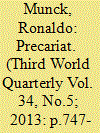

|
|
|
|
|
| Publication |
2013.
|
| Summary/Abstract |
The term 'precariat'-a precarious proletariat-has achieved considerable prominence in recent years and is probably now ripe for critical deconstruction. It also needs to be situated in terms of a genealogy that includes the marginality debates of the 1960s, the later informal sector problematic and the 'social exclusion' optic that became dominant in the 1980s. I will argue that the concept is highly questionable both as an adequate sociology of work in the North and insofar as it elides the experience of the South in an openly Eurocentric manner. In terms of political discourse I think we should avoid the language of 'dangerous class', as deployed by Guy Standing to situate workers politically in the policy world as though frightening the ruling classes was a strategy for transformation.
|
|
|
|
|
|
|
|
|
|
|
|
|
|
|
|
| 12 |
ID:
097448


|
|
|
| 13 |
ID:
165773
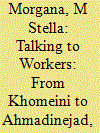

|
|
|
|
|
| Summary/Abstract |
This paper explores the transformations of the Islamic Republic of Iran’s dominant narratives on labor between 1979 and 2009. By analyzing official May Day speeches of this period, it navigates multiple constructions of workers’ roles, which were systematically propagated by the IRI’s Supreme Leader and president over time. The analysis relies on the following primary sources: from the 1979 May Day sermon, pronounced by Ruhollah Khomeini, to the 2009 speech given by Mahmoud Ahmadinejad, together with messages sent by Ali Khamenei, Hashemi Rafsanjani and Mohammad Khatami. Showing how workers’ role—understood as a collective and distinct group—was gradually minimized, this paper argues that a bottom-up cleaning up process slowly purified May Day. In fact, the IRI progressively neglected workers as (revolutionary) social actors and interlocutors, as it stopped talking to masses and started speaking to middle classes.
|
|
|
|
|
|
|
|
|
|
|
|
|
|
|
|
| 14 |
ID:
183136
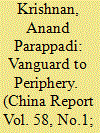

|
|
|
|
|
| Summary/Abstract |
With the ideological undergirding of Marxism–Leninism, the Communist Party of China (CPC) has claimed representation of peasants and workers in its vanguard role in actualising the socialist revolution. However, as China has developed economically over the past four decades, there has been an erosion in the status of workers and peasants as legitimate stakeholders in governance and ruling practices. This article attempts to map how labour, once a critical component of the CPC’s political–ideological invocation, has become peripheral as China transitioned to a market economy with an emphasis on economic rationale for growth and reforms. It examines the changing contours of the CPC’s discourse and practice over the past 100 years on the labour question, sandwiched as it is between the need for continued economic growth as a legitimating tool and the continued reiteration of being representative of the working class.
|
|
|
|
|
|
|
|
|
|
|
|
|
|
|
|
| 15 |
ID:
098272
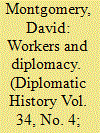

|
|
|
| 16 |
ID:
112343
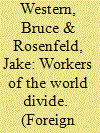

|
|
|
|
|
| Publication |
2012.
|
| Summary/Abstract |
Unions underwrote the affluence of U.S. workers in the last century. They ensured that manual work paid white-collar wages and gave laborers a voice in politics. But now, unions are declining, and the working and middle classes are paying the price. Reviving labor won't be easy -- but doing so is critical to preserving America's economic and social health.
|
|
|
|
|
|
|
|
|
|
|
|
|
|
|
|
| 17 |
ID:
098258
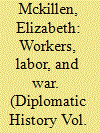

|
|
|
|
|
|
|
|